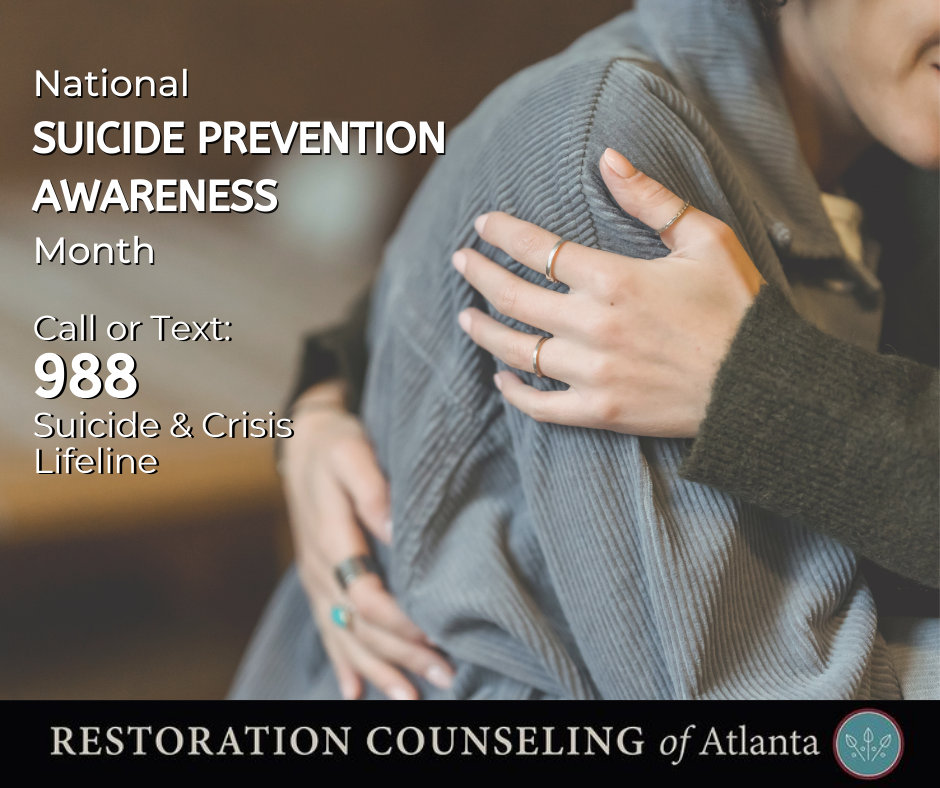Call or Text 988: Suicide and Crisis Lifeline
Memorizing these numbers may help save a life: 988
September is National Suicide Prevention Awareness Month. It is a time set aside to intentionally raise awareness, reduce stigma, and extend support for people who struggle with living or have suffered a loss due to suicide. This is an uncomfortable topic for many people to discuss. It can be painful to think about being suicidal or contemplate someone you love dying. However, it is important to take a few minutes to learn the warning signs, how to intervene, and where to find help. What you know may help save a life!
Approximately 45,000 people in the United States died by suicide in 2020. This behavior is found in people of every ethnicity, gender, and socioeconomic status. In the United States, one person attempts suicide every 27.5 seconds, and one person dies by suicide every 11.5 minutes. It is the third leading cause of death in youth ages 10-19, the second leading cause of death in people ages 20-34, and senior citizens commit 18% of all suicides. Many people who attempt or commit suicide don’t want to die. They want their emotional or physical pain to stop, and suicide becomes an option. If you know the warning signs, can directly discuss suicide and know where to connect for help, you can reduce a person’s risk of death.
Warning Signs
Suicidal thoughts are not uncommon, and all suicidal thoughts and talk about death by suicide need to be taken seriously. Warning signs that may indicate a person is at risk include:
- Depression
- Lack of interest in things once enjoyed
- Feeling purposeless
- Feeling hopeless
- Acting reckless
- Increase use of drugs or alcohol
- Fear of humiliation/shame
- Feeling like a burden
- Unbearable pain
- Anxiety
- Feeling trapped
- Agitation
- Searching online for ways to end life
- Withdrawing from activities
- Giving away possessions
- Talking about not wanting to exist
- Talking about wanting to disappear
- Talking about wanting to kill themselves
Confront with Concern
If you are worried that someone is at risk for suicide, talk to him or her about it. You won’t increase a person’s risk of taking their life by asking if they are suicidal. Often, expressing concern helps a person feel seen and that someone cares about them. All suicidal thoughts need to be taken seriously. If a person is experiencing suicidal thoughts, connect him or her to professional help. If you are unsure how to confront someone, seek guidance.
Getting Immediate Help
Fortunately, help is only a phone call or text away. As of July 16th, 2022, all calls and texts to “988,” connect directly to the National Suicide and Crisis Lifeline. This is a network of more than 200 crisis centers ready to help thousands of people daily. If you or someone you know is struggling to live, or you have questions about how to help a loved one who is suicidal, reach out to resources that are readily available:
- Call or Text 988 to connect immediately to the National Suicide and Crisis Lifeline.
- Call 911 for immediate medical emergencies
- Call 1-800-715-4225 for the Georgia Crisis and Access Line
Join in the Fight Against Suicide
Suicide is a national and global problem that devastates families and communities. The impact of suicide is felt for generations. Bringing awareness to the problem, reducing the stigma associated with mental illness, and providing support for people who need professional assistance are just a few of the many ways you can join the fight against suicide.
Restoration Counseling of Atlanta counselors provide reduced fee counseling to people who are struggling with life or who have lost a loved one to suicide through the help of the Johnny Foundation. The Johnny Foundation is dedicated to raising awareness of depression, PTSD, and suicide prevention, and they fund counseling for those who are unable to pay for the help they need. For more information about the Johnny Foundation or to partner with them in saving lives, you can ask a Restoration counselor or contact them through their website, The Johnny Foundation.
Sources
- American Foundation for Suicide Prevention https://afsp.org/suicide-statistics/
- 988 LifeLine https://988lifeline.org/
- 988 Suicide and Crisis Line Fact Sheet https://www.fcc.gov/sites/default/files/988-fact-sheet.pdf
- The Johnny Foundation https://www.thejohnnyfoundation.org/
- Zur Institute Newsletter, Sebastopol, California, September 2022
 Written by Andrea Brandt, NCC, APC
Written by Andrea Brandt, NCC, APC
andrea@restorationcounselingatl.com, ext. 154
Online Counseling
Andrea received a Master of Arts degree in Clinical Mental Health Counseling from Richmont Graduate University, a Christ-centered university, and currently serves clients in Georgia as an Associate Professional Counselor under supervision and direction. She has continuing education and experience working with addiction and family-related issues and applying cognitive-behavioral therapy (CBT), Exposure and Response Prevention (ERP) for OCD, and Telemental health.

